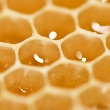
Many people consider using honey for a wide range of medical purposes. But there are several other bee-derived products on the market that patients might ask about – what are they and do they help any conditions?
Some patients might ask about propolis. It’s a resin-like material that bees make to build their hives. And there’s some evidence it might be beneficial for patients with cold sores. Most research shows that applying a cream or ointment containing 0.5% to 3% propolis five times daily reduces pain and helps cold sores heal 3-4 days faster than placebo. If patients want to give it a try, tell them to look for ColdSore-FX by Afexa, as it’s been used in clinical research. Note that some people might experience allergic reactions – people who are allergic to bees or other bee products shouldn’t use it.
Royal Jelly is also growing in popularity. It’s a milky secretion produced by honeybees to feed the queen bee and her larvae. Some clinical research shows that taking it alone or in a specific combination product, Melbrosia, reduces menopausal symptoms. There’s also evidence that applying it to the vagina can improve quality of life and sexual problems, but not as well as estrogen cream. If patients want to give oral products a try, tell them to use 1000 mg daily for 8 weeks. But avoid these products in people with a history of asthma or allergies; they are at a high risk for allergic reactions to royal jelly.
Bee venom is used in an FDA approved injectable product for treating severe allergies to bee stings. Immunotherapy with bee venom provides 98% to 99% protection from systemic reactions to bee stings. But it’s also been studied for many other uses – particularly osteoarthritis and Parkinson disease. Unfortunately, research in both areas is mixed. Tell patients that until there’s higher quality research, bee venom can’t be recommended for either condition.
Lastly, most people are familiar with beeswax and bee pollen. Beeswax is the waxy substance bees use to build honeycombs, and bee pollen is the flower pollen that collects on the legs and bodies of worker bees. Most bee pollen products are marketed as a source of nutrients and protein to boost energy, but there’s no good evidence that they work. And although beeswax has not been extensively clinically studied, it’s commonly used as an emollient in lip balms, lotions, and other cosmetic products.
The information in this brief report is intended for informational purposes only, and is meant to help users better understand health concerns. This information should not be interpreted as specific medical advice. Users should consult with a qualified healthcare provider for specific questions regarding therapies, diagnosis and/or health conditions, prior to making therapeutic decisions. Copyright © 2025 NatMed. Commercial distribution or reproduction prohibited. NatMed is the leading provider of high-quality, evidence-based, clinically-relevant information on natural medicine, dietary supplements, herbs, vitamins, minerals, functional foods, diets, complementary practices, CAM modalities, exercises and medical conditions. Monograph sections include interactions with herbs, drugs, foods and labs, contraindications, depletions, dosing, toxicology, adverse effects, pregnancy and lactation data, synonyms, safety and effectiveness.
